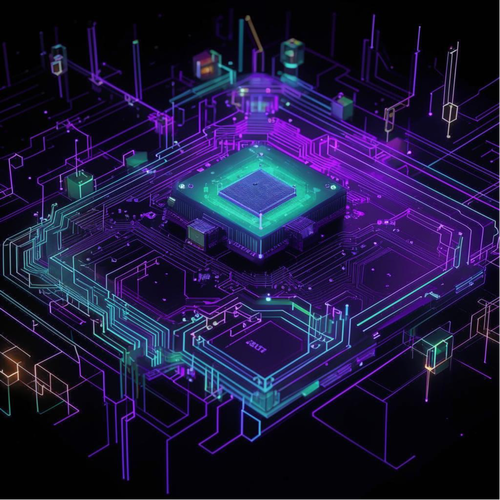The allure of zero-knowledge (ZK) technologies, especially in the realm of blockchain, is undeniable. ZK-Rollups, promising enhanced scalability and privacy, have captured the attention of developers and investors alike. However, the reality of ZK is more nuanced. The computational demands of generating ZK proofs present a significant obstacle to widespread adoption, necessitating a paradigm shift in how we approach ZK computation. This challenge has sparked innovation, leading to the emergence of co-processors – specialized protocols designed to alleviate the computational burden of ZK proofs.
A Primer on ZK: Unlocking Privacy in the Blockchain
Zero-knowledge proofs (ZKPs) represent a revolutionary cryptographic technique that allows a party (the prover) to demonstrate the truth of a statement to another party (the verifier) without revealing any information beyond the statement's validity. Imagine a scenario where you want to prove you are over 21 years old without disclosing your exact age. ZKPs allow you to do just that.
Within the blockchain context, ZKPs hold immense value. They enable:
- Privacy-preserving transactions: ZKPs can be used to mask the details of transactions, such as the sender, receiver, and transaction amount, safeguarding user privacy.
- Scalability: ZKPs can significantly enhance the scalability of blockchains by allowing for off-chain computation, where transactions are verified off the main chain, reducing the computational burden on the network.
Ethereum's Embrace of ZK: A Vision for the Future
Ethereum, one of the leading blockchain platforms, recognizes the transformative power of ZK technologies. Vitalik Buterin, co-founder of Ethereum, has stated that "if the technological transition to privacy is not made, Ethereum will fail." He emphasizes that the need for privacy is critical for widespread adoption of blockchains. Publicly visible transactions deter users concerned about privacy, pushing them towards centralized solutions that offer at least some level of data concealment.
Buterin's vision for Ethereum hinges on the widespread adoption of ZK technologies. He has actively promoted research and development in this area, publishing several articles on ZK and privacy. He has also expressed his belief that "ZK-SNARKs will be as important as blockchains in the next 10 years."
The Computational Challenge of ZK: A Hurdle to Widespread Adoption
ZK proofs offer a compelling solution to the age-old dilemma of balancing privacy with transparency. They allow a party to prove the validity of a statement without revealing any underlying data. This capability is transformative for blockchains, enabling private transactions while maintaining the integrity of the network. However, the process of generating these proofs is computationally intensive. It requires numerous iterations of complex mathematical calculations, leading to three major challenges:
- High computational requirements: Generating ZK proofs necessitates powerful hardware, pushing the limits of current computing resources.
- Costly proof generation: The high computational cost translates into higher fees for users, hindering adoption.
- Delays: The intensive calculations introduce delays, impeding the speed of transaction processing, a crucial element for blockchain scalability.
This computational barrier threatens to stifle the potential of ZK technologies. If we are to fully realize the promise of ZK, we need a solution that can overcome these limitations.
Co-processors: Decentralized Computing for ZK Proofs
Enter the co-processor, a game-changer in the world of ZK. These protocols aim to offload the computationally demanding aspects of ZK proof generation to specialized hardware, such as servers and GPUs. This approach effectively decouples the computation from the core functionality of the application, enabling faster, more cost-effective proof generation.
Several notable co-processors are pushing the boundaries of ZK:
- RISC Zero: This protocol, with its Bonsai framework, takes a decentralized approach to ZK proof generation, utilizing parallel computing across data centers. This distributed architecture can significantly improve efficiency and reduce the reliance on a single entity for computation.
- Gevulot: This protocol focuses on reducing the cost of generating ZK proofs while simultaneously promoting a decentralized approach.
- Zama: This solution provides libraries for secure computation using fully homomorphic encryption (FHE) and ZK techniques, allowing for secure and privacy-preserving computations.
These co-processors represent a diverse landscape of innovation, tackling the computational challenges of ZK from various angles. Each project tackles a specific aspect of the computational workflow, aiming to optimize specific parts of the process.
The Impact of Co-processors: A Catalyst for ZK Adoption
The development of co-processors has far-reaching implications for the future of ZK technologies. Here are some key benefits:
- Technological barrier reduction: The use of co-processors removes the technical barrier for developers wanting to integrate ZK into their projects. Developers no longer need to be experts in complex ZK algorithms; they can simply utilize off-the-shelf solutions provided by co-processor platforms.
- Cost reduction: By offloading computations, co-processors significantly reduce the cost of generating ZK proofs. This makes ZK technologies more accessible for a broader range of applications.
- Increased scalability: The faster, more efficient ZK proof generation enabled by co-processors contributes to the scalability of blockchain networks.
Ultimately, co-processors pave the way for a more inclusive and robust ecosystem for ZK technologies. By democratizing access and reducing the barrier to entry, they will accelerate the adoption of ZK across various sectors, from blockchain to traditional finance.
A Glimpse into the Future: ZK's Potential for Transformation
The emergence of co-processors is a testament to the dynamism of the ZK landscape. This technology holds the key to unlocking a future where privacy and security are paramount, without sacrificing efficiency and scalability. As Vitalik Buterin, co-founder of Ethereum, has emphasized, ZK technologies are essential for the future of blockchain.
By tackling the computational challenges head-on, co-processors are not only enabling the scalability of ZK proofs but also fostering a more secure and private digital world. Their impact will be felt across diverse sectors, as ZK technologies permeate the fabric of our digital interactions. This is a future where privacy is not a luxury but a fundamental right, empowered by the innovative solutions of co-processors.

